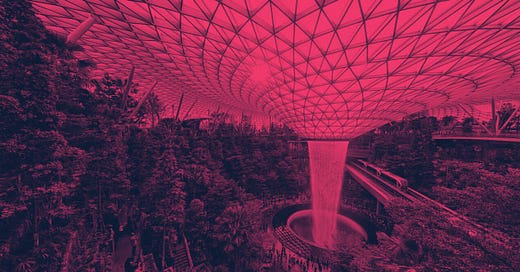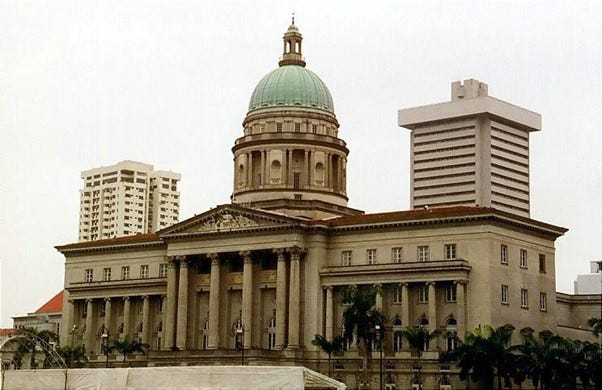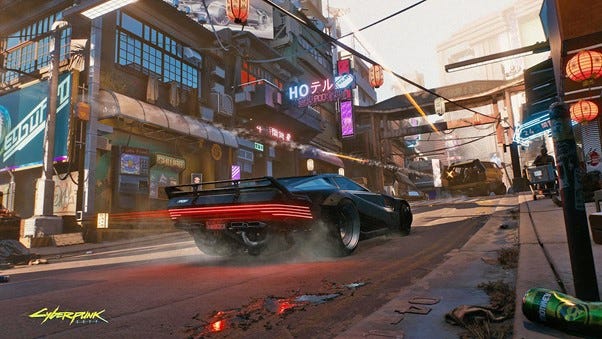Cyberpunk, Singapore and Why We Shouldn't Make a Neuromancer Film.
A bit cold, but that's the price you pay.
"Singapore's airport, the Changi Airtropolis, seemed to possess no more resolution than some early VPL world. There was no dirt whatsoever; no muss, no furred fractal edge to things. "
Two weeks ago, I landed in Singapore, the tropical u/dystopia with chewing gum and dissent in equally few measures. I was one of only three passengers off the plane. There were hundreds of bodies without faces milling throughout the airport, workers in medical smocks and PPE. Half papers pleasing, the other half scrolling Whatsapp in the empty departure gates. One helped me stuff my wool coat into my luggage before I received a regretful blast of tropical soup.
In any other year, Changi is the stranger's grand intro to the hyper-efficient, hyper-consumerist Singaporean lifestyle. Changi's Jewel (pictured above) is the platonic ideal of the mall, the thriving 'public plaza' of unfettered capitalism. This time, its doors were blocked by unceremonious yellow tape.
When discussing Nick Land's all-encompassing techno-capital, Mackenzie Wark explains, "Capital distances itself from reality, hiding behind borders and police. It imports undervalued labour and exports political volatility." In Singapore, this is only half true. It's a culturally conservative country that worships its British colonial heritage but also boasts a robust Ethnic Integration Policy. Zero taxes on capital gains, public housing for 81% of people. Ranked 160th for press freedom, as rare to see a protest as it is common to see a meth head in Launceston.
From the get-go, the journey to my second home came grinding onto a new track.
In 1993, William Gibson, author of the seminal western cyberpunk novel Neuromancer, was sent by Wired to Singapore; his piece Disneyland with the Death Penalty was a damning depiction of his time in the belly of the burgeoning economic tiger.
Despite being written a decade apart, Gibson's article and his opus reflect similar economic anxieties. The fall of the USSR in 1989 had only accelerated neoliberalism's global march. The cultural cross-pollination of cyberpunk cities, the monolith of Hosaka microprocessors and 'cutting edge black market clinics' in Chiba mirrored the American public's fears of Asian financial takeover, dashed by the crash of 1997.
However, its discussion of vice and subculture and how they might be birthed and oppressed in the future is outdated. Gibson's take on Singapore reveals how global capitalism destroys the possibilities of new futures before they begin.
"I took several solitary, jet-lagged walks at dawn when a city's ghosts tend to be most visible, but there was very little to be seen of previous realities…. the physical past, here, has almost entirely vanished."
Guy Debord defines psychogeography broadly as "The study of the specific effects of the geographical environment, consciously organised or not, on the emotions and behaviour of individuals."
To me, the ghosts are taxidermied, petrified in the colonial civic structures converted into art galleries. Singapore's colonial legacy remains high culture, along with the manicured far east flora and fauna and the shuttered storefronts and green lighting of the malls past midnight. All cultures are in agreement, stability, trade and influence from the strait of Malacca and beyond.
I've now had some less-than-solitary experiences in these places, and you always feel like you're disrupting, like some g-man cleaner's gonna come along and sweep you away, not out of malice, just because you're ruining a view no one's witnessing.
"Singapore is a relentlessly G-rated experience, micromanaged by a state that has the look and feel of a very large corporation. "
These days, Singapore is, much like everywhere else, relentlessly R-rated. Vice commodified to ensure consumers value leisure time above their labour. The recent KTV outbreak in euphemistic 'karaoke bars' illustrates that the relationship between mouths and organs is an open secret.
...the faceless functionaries who keep Shonen Knife and Cosmo anti- feminism out of straying local hands going to allow access to the geography-smashing highways and byways of whatever the Internet is becoming? More important, will denial of such access, in the coming century, be considered even a remotely viable possibility by even the dumbest of policemen?
Disneyland was written before cyberpunk's death knell, the Internet beginning to envelop the everyday. In 1993, the Internet was still an enclave of resistance, a place to critique, take the pulsating technologies of research labs and corporations and put them in the hands of degenerates who fancy fiddling with knobs.
Singapore promptly banned Wired upon the publication of this piece, proving Gibson right. However, here I am, drinking San Pellegrino, compiling these articles without any great walls stopping me, only mildly concerned about a takedown notice. Singapore maintains a symbolic block list for appearances, but you'll find fucked up pornography on page 2. Singapore became the Internet; the Internet became Singapore, a network of infrastructure designed entirely for the highly efficient movement of Capital. Rather than the dumbest policeman coming to control the Internet, it was the smartest of industrialists, monopolising into a few key websites we all use.
Katakana, neon lights, open violence, urban decay, shitty cyberpunk bingo.Disneyland with the Death Penalty perhaps shows why we shouldn't make a Neuromancer film today. Both are prescient in their fear of accelerating capitalism and recognising emerging technology's use for all manner of art and vice. But any revolutionary fervour, the toppling of Tessier-Ashpool or Kodak by heterogenous, underneath-the-radar cyberspace are a lost future. Cyberpunk's glitzy synthwave aesthetics, black-mask authoritarianism and sovereign Internet are as corny and incongruous to the present soft power projected and perfected by Singapore as Cyberpunk 2077.
However, Gibson, as usual, still manages a sentence which freaks you the fuck out.
"Singapore... will have proven that information does not necessarily want to be free.”







